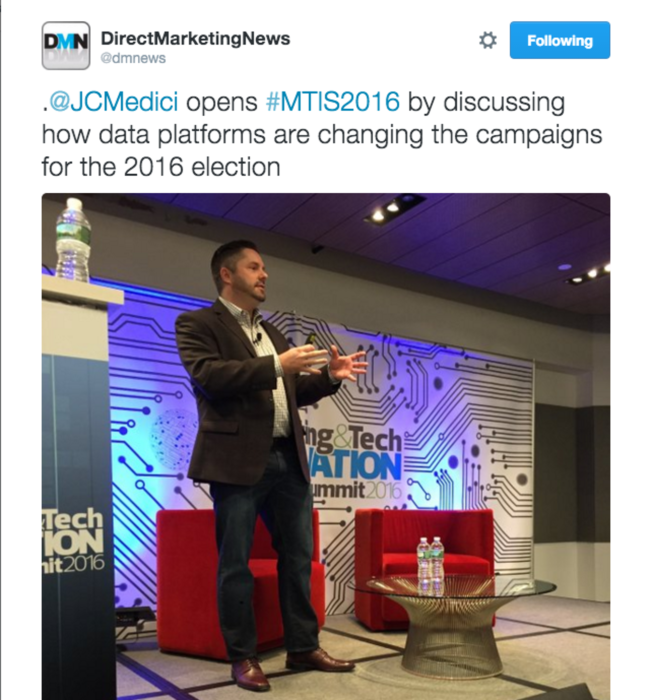.@JCMedici opens #MTIS2016 by discussing how data platforms are changing the campaigns for the 2016 election pic.twitter.com/N7TcmjJHve
— DirectMarketingNews (@dmnews) March 10, 2016
Want to know what it’s like to be a digital marketer turned political marketer? Imagine there are only two clients you can work for, say Coke or Pepsi. Ninety-five percent of their budgets go to television, so you have to work with the scraps. They only have a need to spend money with you every other year, and when they do, their budgets are small and parsed out in dribs and drabs. No million-dollar IOs in this game. Oh, and there’s “no gaining a few share points, losing a few share points” battles. It’s winner take all.
That was the assessment of JC Medici in his keynote address at the 2016 Marketing&Tech Innovation Summit, heralding a new trend of digital marketing agencies going to Washington to be kingmakers. A veteran digital agency jock who four years ago joined Rocket Fuel to run its newly formed political practice, Medici described how the DC digital movement kicked off. “Everybody who worked on the Obama campaign were immediately anointed as geniuses, and it was the political agencies who were perceived as the tech companies,” Medici said. “We’d go into the campaigns and they’d say, ‘Are you Democratic or GOP?’ You had to be one or the other. Then we’d tell them we were the tech people that were working for their agencies.”
Political marketing has long been direct. As former Speaker of the House Thomas P. “Tip” O’Neill once famously said, “All politics is local,” and getting out the vote has always included knocking on people’s doors and filling their mailboxes with direct mail appeals. Medici pointed out that the first political list including ages, occupations, and addresses was compiled by Republican National Committee Chairman James Clarkson in 1891. But the godfathers of the modern data-driven movement in politics, according to Medici, were Howard Dean and former President George W. Bush.
Dean, the Democrat whose own White House run capsized with his famous on-air scream, noticed how Bush operative Karl Rove had developed a list that turned out evangelical voters in droves. The Democrat took that cue to set up an infrastructure of state election data that flowed up to the national level. “By 2008, data had gone mainstream in politics,” Medici said. In that year candidate Barack Obama took data up another level by targeting people on how they stood on individual issues instead of focusing on large economic or demographic segments.
Political marketing’s steady move away from TV and gross rating points to email donations and retweets has never been more evident than in the current presidential race, with historic runs being made by nontraditional candidates such as Bernie Sanders and Donald Trump. “Trump sends out one tweet and eliminates $30 million in ad spending. Jeb Bush spends $100 million on TV and couldn’t move the needle,” Medici said.”This is the first cycle when just as many millennials are voting as baby boomers. Campaigns are going screen-agnostic.”
And it may be the first presidential election since Kennedy-Nixon in 1960 in which political marketing budgets may move away from a 95-5 ration favoring mass marketing on television.








